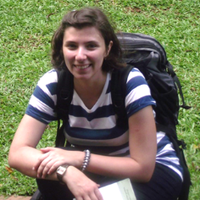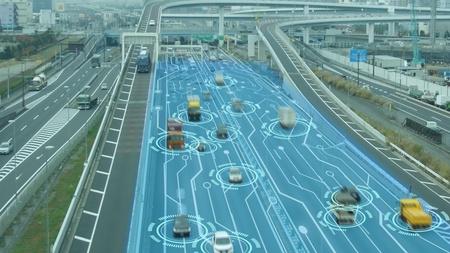
Advanced Research Fellow
- About
-
- Email Address
- neda.trifonova@abdn.ac.uk
- Office Address
School of Biological Sciences
Zoology Building, Rm 416
Tillydrone Avenue
Aberdeen
AB24 2TZ
- School/Department
- School of Biological Sciences
Biography
Neda's research interests include ecosystem modelling; the application of machine learning techniques, such as Bayesian networks, to investigate environmental aspects of offshore renewable energy and climate change. Neda also has interest in natural capital approaches, cumulative and environmental assessments, and evaluation tools for the delivery of environmental net gain and socio-economic benefits.
Qualifications
- PhD Computer Science2016 - Brunel University
Latest Publications
Propagating uncertainty from physical and biogeochemical drivers through to top predators in dynamic Bayesian ecosystem models improves predictions
Ecological Informatics, vol. 92, 103510Contributions to Journals: ArticlesFishing, Offshore Wind Energy, Climate Change and Marine Spatial Planning: Is it possible to plan for a best use of space?
Ecological Solutions and Evidence, vol. 6, no. 2, e70039Contributions to Journals: ArticlesSpatial conflict in offshore wind farms: Challenges and solutions for the commercial fishing industry
Energy Policy, vol. 200, 114555Contributions to Journals: ArticlesMachine Learning Applications for Fisheries: At Scales from Genomics to Ecosystems
Reviews in Fisheries Science and Aquaculture, vol. 33, no. 2, pp. 334-357Contributions to Journals: ArticlesA paradigm for understanding whole ecosystem effects of offshore wind farms in shelf seas
ICES Journal of Marine Science, vol. 82, no. 3, fsad194Contributions to Journals: Articles
Prizes and Awards
- Scottish Universities Life Sciences Alliance (SULSA) Early Career Reseacher (ECR) Prize for the Ecosystems Theme
- British Ecological Society/NatureScot Policy Fellowship 2021-2022
- Research
-
Research Areas

Biological and Environmental Sciences

Computing Science
Current Research
ECOFlow/ Establishing a Framework for Quantifiable Evidence and Impact of Ecosystem Change Throughout the Lifecycle of UK Floating Offshore Wind Farms (EQUIFy) (2025-28, NERC/The Crown Estate).EQUIFy will use an array of modelling approaches, autonomous monitoring systems and decision support tools to provide a transferable evidence framework that improves current understanding of the likely future effects of FLOW, with a focus on planned developments in the Celtic Sea. I am a Co-Investigator in Work Package 5 that brings together a range of physical and biological observations and modelling outputs with established decision support tools tailored to enhance the capabilities of planners, spatial managers and industry, to access evidence guiding sustainable development of FLOW.
ECOWind/ Physics-to-Ecosystem Level Assessment of Impacts of Offshore Windfarms (PELAgIO) (2022-25, NERC/The Crown Estate). PELAgIO will support the development of evidence-based policy and marine management through interdisciplinary research that explores the consequences of offshore wind development on marine ecosystems. By observing and modelling over a large range of physical and biological scales, using a combination of autonomous platforms and ocean robots, research vessels and satellite observations, PELAgIO will build an ecosystem-level understanding of projected changes.
The Marine Energy, Biodiversity and Food Nexus (EcoNex) (2022-24, UKERC). This project will work with renewable industry and policy bodies to enable evidence-based, informed actions to improve decision making when balancing environmental, social, and economic impacts and ensuring marine net gain, as part of national policy assessments.
Supergen Offshore Renewable Energy (ORE) Hub (2019-2022 EPSRC). The aim of the project is to bring together and stimulate synergistic adventurous research that supports and accelerates the development of offshore wind, wave and tidal technologies for society’s benefit. Neda will be using machine learning techniques such as Bayesian networks to investigate the effect of offshore renewable energy and climate change on the North Sea marine system. She also will be looking at developing evaluation tools to enable the exploration of trade-offs in a range of currencies for net gain, such that objective judgements can be made as to how to best maximise the environmental and social co-benefits, while delivering net zero.
Past Research
- National Oceanic and Atmospheric Administration’s Integrated Ecosystem Assessment Programme for the Gulf of Mexico (2017-2019). Development of quantitative and qualitative Bayesian network models for the better understanding of population dynamics within different ecosystems.
- PhD in Computer Science from Brunel University, 2016. Development of dynamic Bayesian networks to investigate fish population dynamics throughout space and time within the North Sea and understand their interactions with fisheries and climate. The PhD was conducted in collaboration with the Centre for Environment Fisheries Aquaculture Science (UK) and the Maurice Lamontagne Institute, part of a network of Fisheries and Oceans (DFO), Canada in Mont-Joli, Quebec.
Supervision
- Morgane Declerck, PhD Candidate (2019-2023). Project title: “Sustainable Marine Ecosystems and Offshore Energy: A Bayesian modelling approach”. DEFRA BEIS Hartley Anderson Ltd
- Ella-Sophia Benninghaus, PhD Candidate (2020-2023). Project title: “Climate Change and Predator-prey Populations”. SUPER-DTP
- Alan Anderson, PhD Candidate (2024-2027). Project title: "Using machine learning approaches to predict and understand consequences of extreme events". ORE Supergen Hub Phase 2
Funding and Grants
- Scottish Alliance for Geoscience, Environment and Society (SAGES) Postdoctoral and Early Career Researcher Exchange (PECRE) Award (PI)
- Scottish Universities Life Sciences Alliance (SULSA) Early Career Researcher (ECR) Prize Winner 2020 Ecosystems Theme (PI)
- Publications
-
Page 1 of 3 Results 1 to 10 of 22
Propagating uncertainty from physical and biogeochemical drivers through to top predators in dynamic Bayesian ecosystem models improves predictions
Ecological Informatics, vol. 92, 103510Contributions to Journals: ArticlesFishing, Offshore Wind Energy, Climate Change and Marine Spatial Planning: Is it possible to plan for a best use of space?
Ecological Solutions and Evidence, vol. 6, no. 2, e70039Contributions to Journals: ArticlesSpatial conflict in offshore wind farms: Challenges and solutions for the commercial fishing industry
Energy Policy, vol. 200, 114555Contributions to Journals: ArticlesMachine Learning Applications for Fisheries: At Scales from Genomics to Ecosystems
Reviews in Fisheries Science and Aquaculture, vol. 33, no. 2, pp. 334-357Contributions to Journals: ArticlesA paradigm for understanding whole ecosystem effects of offshore wind farms in shelf seas
ICES Journal of Marine Science, vol. 82, no. 3, fsad194Contributions to Journals: ArticlesEcosystem indicators: Predicting population responses to combined climate and anthropogenic changes in shallow seas
Ecography, vol. 2024, no. 3, e06925Contributions to Journals: ArticlesClimate Change Impacts on Fish of Relevance to the UK and Ireland
MCCIP Science Review 2023. 17 pagesBooks and Reports: Commissioned Reports- [ONLINE] DOI: https://doi.org/10.14465/2023.reu10.fsh
Cumulative effects of offshore renewables: From pragmatic policies to holistic marine spatial planning tools
Environmental impact assessment review, vol. 101, 107153Contributions to Journals: ArticlesA new strategic framework to structure Cumulative Impact Assessment (CIA)
International Marine Energy Journal, vol. 5, no. 3, pp. 339-347Contributions to Journals: Articles- [ONLINE] DOI: https://doi.org/10.36688/imej.5.339-347
- [OPEN ACCESS] http://aura.abdn.ac.uk/bitstreams/55e012db-9ca1-4d84-bd0a-275760e183af/download
- [ONLINE] View publication in Scopus
An ecosystem-based natural capital evaluation framework that combines environmental and socio-economic implications of offshore renewable energy developments
Progress in Energy, vol. 4, no. 3, 032005Contributions to Journals: Articles
